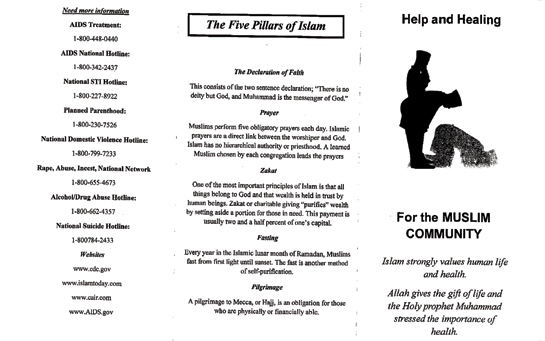
The State of Maryland is revamping their initiative in between the Department of Health and Mental Hygiene (DHMH), the Infectious Disease and Environmental Health Administration (IDEHA) and the Office of Faith Based Community Partnerships (OFBCP) to bring infectious disease prevention material to the Muslim community.
Carmi Washington Flood, Chief of the Office of Faith Based and Community Partnerships sent out letters accompanying a draft of a brochure on infectious diseases to Maryland mosques, asking for review of the material through a ten question survey that accompanied each mailing.
Each brochure is custom made to fit the beliefs and icons of the faith community to which it is geared. The front of the brochure for the Muslim community titled “Health and Healing” reads, “Islam strongly values human life and health. Allah gives the gift of life and the Holy prophet Muhammad stressed the importance of health,” underneath a clipart image of a man performing prayer.
Its interior panels provide information on infectious disease prevention and health care services. Human immunodeficiency virus (HIV) information takes a full panel, sexuality transmitted infections (STIs) take up another and information Hepatitis and Tuberculosis are included on a third panel.
The brochure also provides toll free phone numbers for more information on infectious diseases as well as social services concerns such as domestic violence, rape, abuse and suicide.
The Department also included customized websites that may be of interest to the faith-based community. On the brochure for the Muslim community, Islamtoday.com and CAIR are sandwiched between the web addresses for the Center for Disease Control and the government AIDS information website.
Perhaps the most unique aspect of the government initiative is the full-panel dedication to the five pillars of Islam in the brochure. Each brochure includes the key beliefs of the faith community it is designed to reach. This inclusion, said Flood, was something that was not only very popular but important to the success of literature itself.
“We also kept the tenants of faith because people said they wanted to still hold onto the values. Even in the midst of looking at the broader issue of science the basic tenants have not changed,” said Flood.
Flood said that connecting with faith communities in the State was essential to the dissemination of health information to the community because of the unique way in which those who associate with faith perceive health and healing.
“The difference between the faith community and other communities is that the faith community, because it’s wrapped in spirituality, [when] the faith community talks about [being] healthy, [it] talks about wholeness. There is a different level of hope that is offered within the faith community because of the belief system,” said Flood. “There is a [high] level of support, of greater support, outside of the person themselves that is wrapped up in the communal belonging that is not there with someone sitting in the doctor’s office by themselves.”
While the brochures have been in circulation for almost six years, they are currently going through an overhaul. New information on infectious diseases is being added but while the science is getting an update, the religious content is staying much the same.
As of now, the draft of the brochure is being circulated and feedback is trickling in already. Flood said the method by which the brochure is being developed gives her the confidence that each community will find the information respectfully presented and useful.
“When we create the final piece, then we can with confidence put it out in the community and say ‘Guess what, your faith leaders have vetted this for us in a way that we’re using their expertise, we’re using their relational savvy, we’re using their knowledge of their congregants and communities as to what is most beneficial for them,’” said Flood.
Alongside the new brochures customized for each faith community, the Department also offers customized seminars for religious leaders and communities on health topics. Because of the varying levels of comfort and differing lifestyles and customs between religions, the OFBCP has created specific curriculum for each faith as well. While taboo topics in certain communities may be a concern, Flood said that it only becomes an obstacle when there’s a lack of cultural competence.
“You run into that if you’re not making a purposeful attempt to be culturally competent. If I am going to come to the Muslim community I am going to come with a curriculum around those core values that they hold,” said Flood. “The beauty of making it culturally competent is that we’re not coming in at odds of what is being discussed [in the community].”
Flood hopes the material makes infectious disease information easily available to everyone but also believes that providing such material will give faith leaders confidence that, when needed, information is out there that is designed to be scientifically comprehensive while still being religiously cohesive.
“It’s about really letting faith leaders know that they have good resources and good partners within government,” said Flood. “...the leader is the voice there and [we are] only working through them to provide for their congregation what they feel they need at a rate they can accept it and take it in.”









Comments powered by CComment